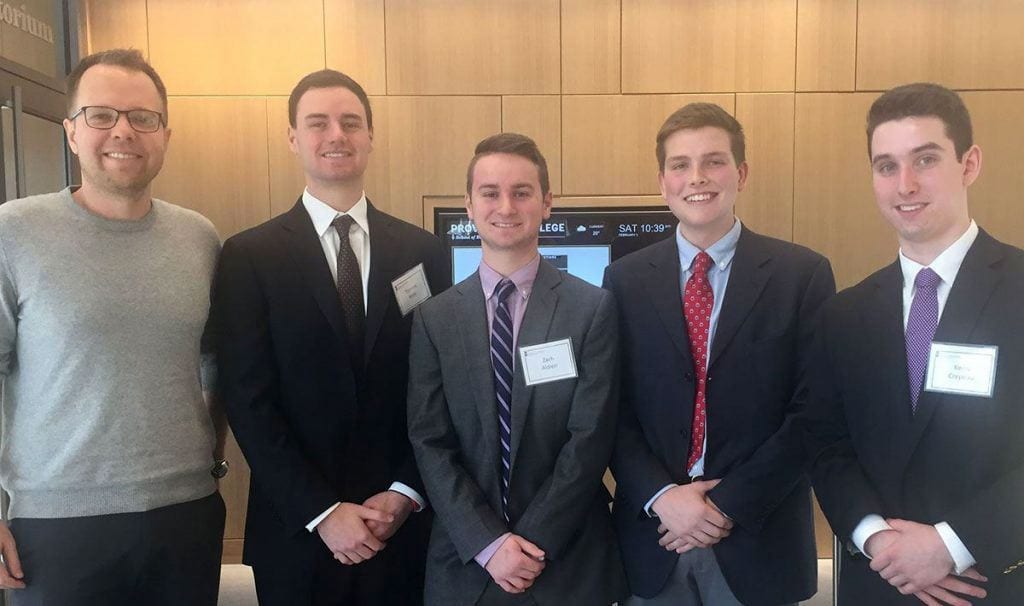Students analyze the NFL’s response to brain trauma in ethics competition
By Lauren Cotta ’19
Students in the Providence College School of Business tackled the topical issue of how the NFL should respond to instances of brain trauma experienced by current and former players. Their challenge came during the second Michael Smith Ethics Case Competition held in the Arthur F. and Patricia Ryan Center for Business Studies.
Dr. Patrick T. Kelly, professor of accountancy and director of the College’s Ethics in Business Education Program, said the NFL’s response to chronic traumatic encephalopathy cases was selected as the ethical issue by the competition’s committee after it read a July 2017 Wall Street Journal article that reported on a medical study. The report stated that CTE was diagnosed in the brains of 110 out of 111 former NFL players.
The competition, named for Michael Smith ’65, the former CEO and chairman of the board of Hughes Electronics Corp., was won by the team of Kerry Crepeau ’20 (Biddeford, Maine), Thomas Kelly ’20 (Southport, Conn.), Jack Cassidy ’20 (Pasadena, Md.), and Zach Aldieri ’20 (Bristol, Conn.). The team’s adviser was Dr. Marcin Krolikowski, assistant professor of finance. The team shared the first-place prize of $2,000 for presenting the best ethical argument among the 13 teams that competed.

The competition opened with a semifinal round involving all teams, each comprised of four students. Four teams were selected for the final round. Alumni and members of the faculty and staff served as judges. Kelly was the competition’s director. The format called for 15-minute team presentations, followed by questions from the judges.
Students who participated said the seriousness and timeliness of the topic heightened the pressure of the competition. Analyzing CTE and thinking about the NFL’s response were challenging, they said, but at the same time they found it rewarding to think through such a highly visible and emotional issue.
“Hypothetical situations can sometimes detach importance in an ethics case, but real-life issues call for real-life problem solving,” said Aldieri.
“It was challenging to address CTE,” said Julia Scoleri ’21 (Northport, N.Y.), another competition participant. “… There are so many players that my group and I grew up watching on TV, and to see them go through terrible conditions because of CTE is really upsetting.”
The winning team advised the NFL to create rules in favor of less physical contact, improve players’ helmets, and even suggested that the NFL fund protective equipment on the high school level, where many head injuries begin.
While competing, the students claimed they learned a lot about ethical philosophies and gained a better understanding of how ethics and business interact.
“Ethics are not only a skill, but a lifestyle that goes far in the real world when building relationships,” said Aldieri.
Krolikowski noted: “Everything we teach at PC is based on the assumption that people are ethical.… In business, we make projections based on financial statements, and this analysis is in vain if the CEOs and CFOs writing these statements are unethical.”
Krolikowski assisted the winning team in organizing its presentation and placed a heavy emphasis on the question and answer segment of the competition. He said the students’ thorough preparation and ability to predict the judges’ questions set them apart.
Krolikowski also explained that through their dedication the students learned how to formally present and solve problems under a time constraint — like that of the real business world.

Cassidy agreed that their preparation directly led to the team’s success.
“Winning the competition was an exciting achievement,” he said. “The hard work and research our team put into the case paid off. … All the team members were well versed in the topic and had a genuine interest in the issue.”
Looking forward, Cassidy discussed how the ethics competition and the PC curriculum complement each other and will continue to benefit future students.
“The liberal arts background provided for students at PC will allow them to address business issues while looking through an ethical prism.… By tackling a problem ethically, one can find solutions that benefit all parties involved,” he said.
Kelly pointed out how he is continually impressed by the PCSB faculty’s efforts to connect students to the real world through ethics and highlighted the importance of including ethics in the business curriculum.
“Ethics and ethical behavior is the foundation of business,” said Kelly. “Ethics has been a central focus of our School of Business mission: to provide a values-based business education that enables students to excel in their chosen field and prepares them for meaningful work and life in a dynamic world.”





